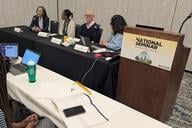You have /5 articles left.
Sign up for a free account or log in.
Two linked Minnesota Roman Catholic institutions are reducing language and other humanities offerings, including nixing all their ancient Greek and Chinese classes.
The provost of the College of Saint Benedict and Saint John’s University has cited overall enrollment decreases and specifically low enrollments in these courses.
In its fall newsletter, the Modern Language Association noted combined undergraduate and graduate course enrollments in languages other than English declined 15.4 percent from 2016 to 2020—the largest drop since it began its survey in 1958.
The pandemic decreased college enrollment over all, but “language enrollments at four-year public and private nonprofit institutions decreased disproportionately, declining by 15 percent while overall student enrollments declined by only 0.4 percent,” the association wrote.
There was only a 3 percent drop in ancient Greek, but roughly 21 percent drops in Latin, Chinese and French, and a 32 percent decline in German.
Jeffrey Henderson, director of the classics advisory service for the Society for Classical Studies, said, “Even the best-heeled schools are not growing their humanities programs.” But he said there are financial issues at smaller colleges that “are general problems, not just of humanities.”
“These schools are in danger of demographic decline, regional decline and various factors beyond their control, really,” Henderson said.
In Minnesota, the College of Saint Benedict, for women, and Saint John’s University, for men, are about 10 minutes apart. A university spokesman says they have 2,900 undergraduate students combined. The institutions share classes, faculty members, administrators and governing board members.
Late last month, those board members approved eliminating:
- The Asian studies major and minor
- The Chinese minor and Chinese courses
- The ancient Mediterranean studies major
- The classical languages major and minor
- The Greek minor and Greek language courses
- The Latin minor
- The French studies major and minor
- The German studies major and minor
- The Japanese minor
- The theater major
- Music concentrations in composition, performance and liturgical music
- The gender studies major
- The peace studies major and minor
- The dietetics concentration and the accredited dietetics program
Except for dietetics, all of those being eliminated are in the liberal arts.
“We will still offer language courses in German, French, Japanese and Latin,” said Provost Richard Ice. He said the linked institutions will maintain their requirement that students take a three-course sequence in the same language—something they can currently be exempted from by scoring high enough in testing.
Ice provided charts showing that, among the majors being eliminated, dietetics has 29 students enrolled, peace studies has 10 and all the rest have fewer. Minnesota is going to start requiring a master’s degree for licensed dietitians, instead of what the linked institutions offer.
The music concentrations each had fewer than three students enrolled, the charts show. As for minors, the biggest enrollments were the 31 students in Japanese, 16 in German studies and 11 in Chinese, with the rest below 10.
Zero students were in the Greek minor.
“Many of the languages had also agreed that they wouldn’t be able to sustain the major,” Ice said. He said faculty voted against nixing the language, Asian studies and peace studies minors, “but when the board looked at that, they did not see those as sustainable.”
The linked institutions’ Languages and Cultures Department chair and employees contacted there didn’t provide comment for this article.
Ice said the changes will mean 25 fewer full-time-equivalent positions, but the linked institutions have already reduced about 20 of those positions, including through retirements. He said there’s an ongoing incentivized retirement program.
The linked institutions’ enrollment has dropped 25 percent over the past 15 years, he said.
“It was about prioritization,” Ice said of the program cuts. “We [have] a number of programs that are large and growing, and some of them, I’ll grant you, are in the professional programs. But we did not have the resources to move into those areas of high demand by students, and so this was about repositioning.”
The linked institutions say they have added seven programs in recent years: graduate-level nursing, an exercise and health science major and minor, and minors in climate studies, data analytics, global health, narrative practice and neuroscience. Ice said it’s hiring nine tenure-track positions next year.
He also suggested the liberal arts can be “a more fluid line of inquiry that’s across your general education requirement, that’s bringing in multiple ways of thinking across lots of disciplines—even though you might not have the major in the program.”
Parker Wheatley, an economics professor who chairs the joint Faculty Senate and Faculty Assembly, wrote to Inside Higher Ed that the “academic prioritization process” was “difficult and thorough.”
“Just as our students must evolve with changing conditions, we must evolve,” he wrote. “We feel the loss of programs acutely, but we believe that we will thrive as we engage in new initiatives and re-imagine existing programs to support our students.”
“We have had a major overhaul of our general education curriculum to provide a more integrated and meaningful core liberal arts experience, and we have engaged in a rigorous process of review of programs to consider increased investments in some areas and reducing investments in other areas to serve students,” he wrote. “While faculty and administration did not agree on all points, we took care to work together as a community to engage in a process that permitted careful and rigorous conversations.”
Henderson, who in addition to his Society for Classical Studies service is an emeritus professor at Boston University, said it’s hard to replace these offerings once they’re cut, so it’s better to keep them “on a low boil.”
“When I talk to schools facing those kind of choices, I often emphasize to take a long view if possible—to trend, maybe, in response to enrollment trends, but not to turn out the porch light, because, eventually, students who really love classics or English or humanities generally will want to do that in college,” he said.
“I don’t see the end of the humanities or the end of classics by any means,” he said, “and in many ways classics is in a new place right now, expanding from Greece and Rome to the entire Mediterranean and Near East and then to Africa in some respects.”
“In many ways it’s a very dynamic field,” he said.
“It’s been in crisis for 800 years,” he said, “so it manages because it’s so interesting.”




